What to expect during/after treatment:
Medication
Research the medication your neurologist sends you home with either for daily treatment or after surgery. Keep an eye out for side effects and know what to expect from the meds. For example, steroids can cause the animal to drink more water and urinate more. I noticed urine smells worse when steroids are being used.
Things like pill pockets, cheese, etc are good for hiding pills. Even if they are blind they can smell the meds. Try to make it as enjoyable as possible. I
Prepare for Shunt Surgery Your neurologist will prep you for that day as far as not feeding after a certain time, etc. Your pet will stay there to recuperate for a few days and be under observation. Shunt surgery should be done as soon as possible after diagnosis confirms it is needed. *Make sure to schedule this when you have time to care for your pet.
After Surgery
The way your pet looks may shock you. The staples, incisions and shaved hair can be "Frankenstein-ish", this will look better soon. Keep them clean. Bathing cannot be done because of the stitches/stapes but preventing them for being is situations where they can get dirty and keeping their living area clean is important. Watch for infection or complications. Buying a thermometer and vasoline is a good idea. Ask your neurologist to show you how to take their temperature so you can monitor it from home after surgery. Average temperature for a dog or cat is between 100.5-102.5. Call you neurologist immediately if they have a high temperature or show any signs of infection or complications. The meds they send home should help prevent infection so using Neosporin on the body is optional - ask your neurologist. Pain meds will be sent home also - do not over dose these, give as prescribed. If you think you need to up the dosage get the approval from the neurologist first.
Make sure they eat & drink to keep their strength up. Losing weight during this time is not abnormal. Putting on an extra pound or two before surgery may be a good idea, ask your neurologist.
Check UpsPrepare for several check ups, your neurologist will want to see them several times with in the first 6 months after surgery, whether they are doing well or not. These visits will get further apart if your pet is doing well.
The Future
No more collars! After shunt surgery your pet can no longer wear a collar around the neck. Not wearing an identification tag (name, address, phone number) is not an option. If your pet gets lost they will be in a scary world they cannot survive in with their condition. Microchips are good if they are picked up by animal control and taken to a shelter or taken to a vet for scanning. But an ID tag is needed if they are picked up/helped by a regular person. People are more likely to pick up and help an animal with an ID tag vs. one without.
How to solve this? A soft harness is the way to go. Check out the "Puppia" line. They are soft, washable, durable and fits the need. You can buy the "Puppia Harness" through many US retailers online. Just do a search on the web. Below is a link to the the manaufactors European website. http://www.puppia.com.au
Information and resources about Hydrocephalus in pets
Pages
Pages
Contact Us
What to expect - Surgery
HYDROCEPHALUS IN PETS
BABY LOVE'S STORY
This is Baby Love's Life:
Birth

Baby Love was born in an animal shelter on July 7, 2007, her mom Amber was a stray who had been picked up a few days before. Baby Love was one of 9 puppies.
Different

Soon we realized she was different from the others. She was always by herself and not in the puppy huddle. So we started bottle feeding her and keeping a careful eye on her.
Going Home

At 4 weeks old she contracted both ringworm and kennel cough so I took her home and nursed her back to health. She was also physically and mentally behind the other puppies.
Blossoming

Though still sick, Baby Love thrived in her new enviroment. She had lots of affection and constant feedings. She blossomed, and a day or two after arriving at the house she was a new dog. She was happy and ready to start exploring the world.
Blindness
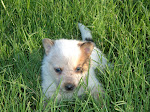
She took on the world one bunny hop at a time. I soon realized there was more wrong with Baby Love than we thought. She was blind!
Growing
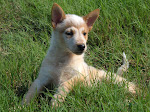
Baby Love continued to grow, and after some research we discovered that she most likely had Hydrocephalus (fluid on the brain). There was a newspaer article written about her, and we started a fundraising drive for tests and treatment.
MRI
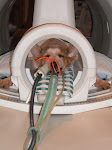
The day came and she had an MRI, which confirmed she had Hydrocephalus.
Surgery
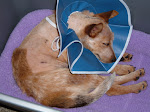
Thanks to donations, Baby Love had surgery to try and correct her condition.
Success

The sugery was a success, though she did not gain sight she became a much happier dog, her motor skills were great and she had a thirst for life I'd never seen before.
Everyday Life
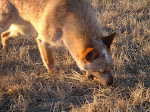
She loved to run, bunny hop, explore and find mischief.
Summer

Summer came around again and she was the best she'd ever been. She loved the other dogs and our cuddle time
Signs of Trouble

Around Memorial Day of 2008 she started having some issues. We soon discovered her shunt which was installed in her body to assist with the excess fluid development - had stopped working.
The End

Thanks to donations she had a second surgery. She did not recover well, and a week later she passed away. Baby Love had sponsors and well wishers from all over the world who followed her story. I thank them all!
No comments:
Post a Comment